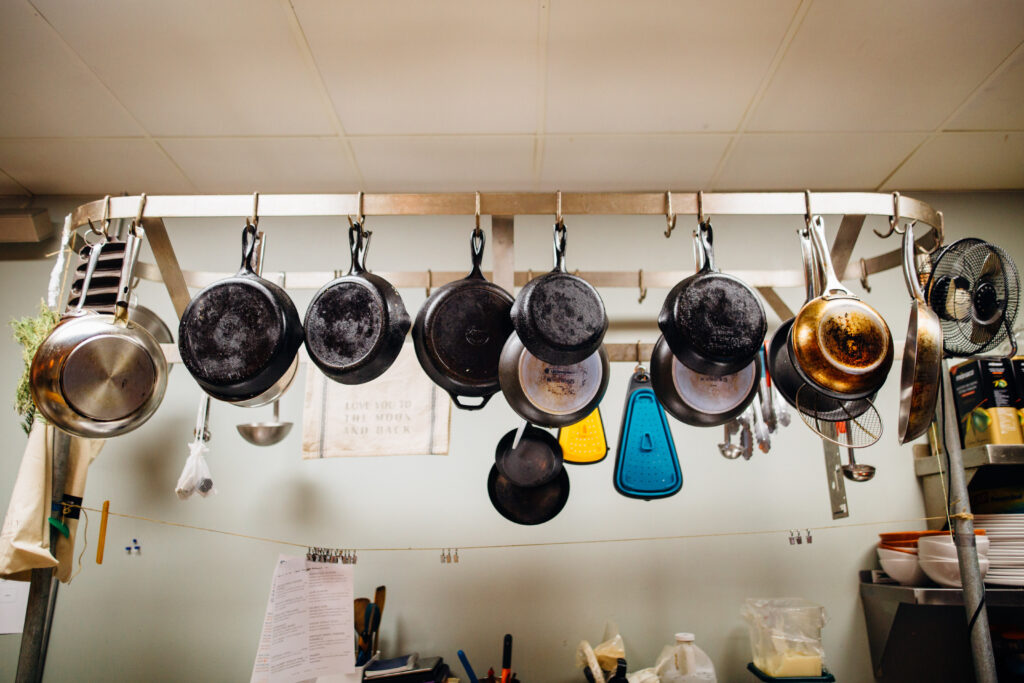If you’re a fan of Calphalon cookware, you might be wondering if you need to season it. This article explores one of the most asked questions about Calphalon cookware:
Does it need to be seasoned? Seasoning is a common practice for many types of cookware, but is it necessary for Calphalon? Let’s find out.
Do I need to season my Calphalon cookware?

Understanding Seasoning in Cookware
Seasoning is a process that involves applying a thin layer of oil or fat to the surface of cookware and heating it to create a protective and non-stick layer. This layer helps prevent food from sticking to the surface and makes cooking and cleaning easier. While seasoning is commonly associated with cast iron cookware, there is some confusion as to whether it is necessary for Calphalon cookware.
Benefits of Seasoning Cookware
Seasoning cookware offers several benefits. First, it creates a natural non-stick surface that reduces the need for excessive oil or butter during cooking. This can be especially advantageous for those who are watching their fat intake or prefer a healthier cooking method. Additionally, seasoning helps prevent food from sticking to the pan, making it easier to flip delicate items like fish or pancakes. Furthermore, a well-seasoned pan can develop a beautiful patina over time, enhancing its overall appearance.
Is Seasoning Required for Calphalon Cookware?
Calphalon cookware is known for its durable non-stick coating, which eliminates the immediate need for seasoning. Unlike traditional cast iron or carbon steel pans, Calphalon cookware pans come with a non-stick surface that is specifically designed to offer excellent food release and easy cleanup. Therefore, seasoning is not required for Calphalon cookware.
What is Calphalon Cookware?
Calphalon cookware is a popular brand that is widely recognized for its high-quality cookware. Founded in the 1960s, Calphalon cookware has been a leading innovator in the culinary industry, continuously introducing new technologies and materials to improve cooking experiences. Calphalon cookware offers a wide range of cookware options, including pots, pans, and bakeware, all designed to meet the needs of both home cooks and professional chefs.

Calphalon cookware is typically made from different materials, such as stainless steel, aluminum, or a combination of both. The choice of material depends on the specific line of Calphalon cookware. Stainless steel provides durability and a sleek appearance, while aluminum offers excellent heat conductivity for better cooking performance. Some Calphalon cookware lines also feature a hard-anodized aluminum construction, which provides enhanced durability, even heat distribution, and easy cleanup.
Types of Calphalon Cookware
Calphalon cookware offers various types of cookware to suit different cooking needs and preferences. Some popular types of Calphalon cookware include:
- Calphalon Non-stick Cookware: These pans feature a durable non-stick coating that ensures easy food release and quick cleanup. They are perfect for cooking delicate foods like eggs, pancakes, and fish.
- Stainless SteelCalphalon Cookware: This line of cookware offers the classic beauty and longevity of stainless steel. It is resistant to staining, corrosion, and discoloration, making it perfect for everyday cooking.
- CUnison Calphalon Cookware: Unison Calphalon cookware features a unique non-stick surface that lets you cook with little to no oil or fat. It offers exceptional food release and is incredibly easy to clean.
- Contemporary Calphalon Cookware: This line of cookware combines stainless steel with a heavy-gauge aluminum core for even heating. It features a brushed stainless steel exterior and a non-stick interior for easy cooking and cleanup.

Calphalon’s Non-stick Coating
One of the standout features of Calphalon cookware is its non-stick coating. Unlike traditional seasoning, which involves applying oil or fat to create a non-stick surface, Calphalon cookware comes pre-coated with a durable and long-lasting non-stick coating.
This coating is typically made from multiple layers of fluoropolymer, a type of synthetic resin that provides excellent release properties.
The non-stick coating allows for easy food release with little to no oil, making cooking healthier and cleanup a breeze.
Calphalon Cookware and High Heat
Calphalon cookware is designed to withstand high-heat cooking. Most Calphalon cookware pans are oven-safe up to a certain temperature, usually around 500°F (260°C).
Which allows for a wide range of cooking techniques, including searing and roasting. However, it’s worth noting that excessive heat or overheating can damage the non-stick coating and reduce its lifespan.
It is always recommended to follow the manufacturer’s instructions and avoid using high heat unless specified.
Alternatives to Seasoning Calphalon Cookware
Since Calphalon cookware does not require seasoning, there are alternative methods to enhance its performance and prolong its lifespan.
One important aspect of proper maintenance is ensuring that the non-stick surface remains intact. Avoid using metal utensils, which can scratch or damage the coating.
Instead, opt for silicone, wood, or nylon utensils that are gentle on the non-stick surface.
Regular cleaning is also crucial in maintaining the non-stick properties of Calphalon cookware. Hand wash the pans with mild dish soap and a non-abrasive sponge or cloth.
Avoid using harsh cleaners or scouring pads, as they can damage the non-stick coating. For stubborn food residue, soak the pan in warm, soapy water before gently scrubbing.
Proper Maintenance of Calphalon Cookware
To keep your Calphalon cookware in excellent condition, follow these tips for proper maintenance:
- Avoid using metal utensils: Stick to silicone, wood, or nylon utensils to prevent scratching the non-stick coating.
- Hand-wash with mild dish soap: Use a non-abrasive sponge or cloth to gently clean the cookware. Harsh cleaners and scouring pads can damage the non-stick coating.
- Avoid excessive heat: While Calphalon cookware is designed to withstand high heat, using excessive heat can shorten the lifespan of the non-stick coating. Follow the manufacturer’s instructions regarding recommended temperature limits.
- Store properly: To prevent scratches and maintain the non-stick surface, stack Calphalon cookware with a protective layer, such as a paper towel or silicone mat, between each piece.
Conclusion
In conclusion, seasoning is not required for Calphalon cookware. With its durable non-stick coating and exceptional food release properties, Calphalon cookware offers a hassle-free cooking experience.
By following proper maintenance practices and avoiding harsh cleaning methods, you can ensure that your Calphalon cookware will remain in excellent condition for years to come.
So go ahead and enjoy your cooking adventures with the convenience and reliability of Calphalon cookware!
 Calphalon cookware 10-Piece Cookware review
Calphalon cookware 10-Piece Cookware review
Happy Cooking!

